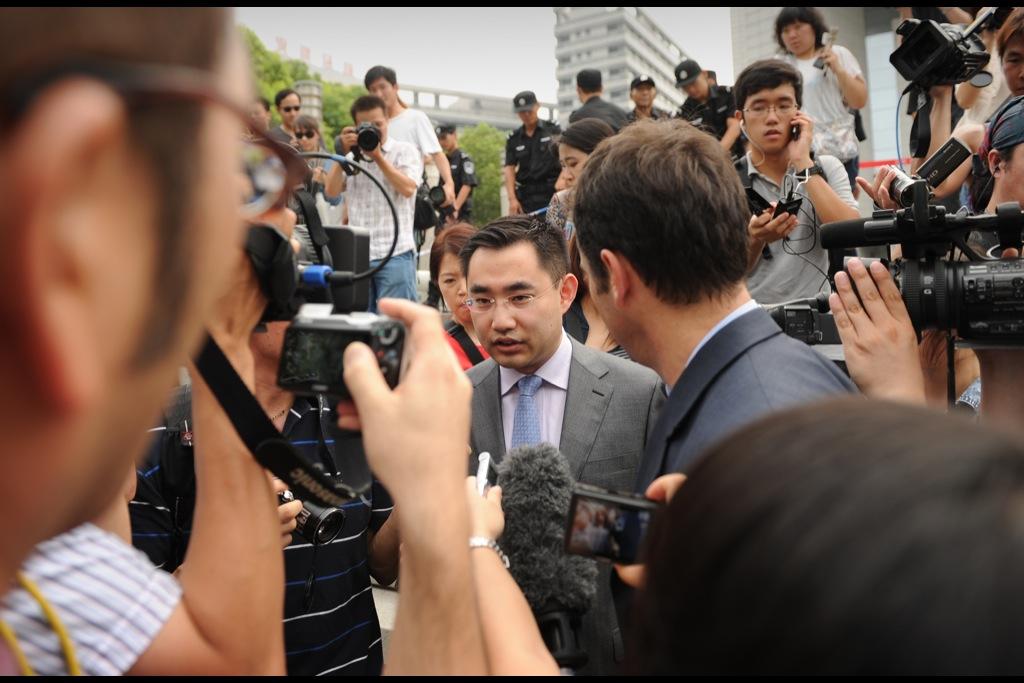Gu Kailai, wife of fallen party boss Bo Xilai, given suspended death sentence for Neil Heywood murder
He Zhengsheng (C) a lawyer for the family of British murder victim Neil Heywood is surrounded by reporters as he leaves the Intermediate People’s Court in Hefei, Anhui province on August 20, 2012, after Gu Kailai, wife of the disgraced leader Bo Xilai, was given a suspended death sentence for Heywood’s murder.
HONG KONG – China’s most politically perilous scandal in decades was wrapped up tidily in a Hefei courtroom this morning — almost too tidily, experts say.
Gu Kailai, the once-elegant wife of fallen party boss Bo Xilai, was convicted of the murder of Briton Neil Heywood, and given a suspended death sentence, which typically becomes a life sentence after two years.
Though murderers in China are often given a bullet to the back of the head, few expected that Gu, who is connected to the highest rungs of power, would suffer the same fate.
Gu greeted her verdict with surprising equanimity, according to courtroom accounts, saying that her sentence was “just and reflects a special respect toward the law, reality and life.”
More from GlobalPost: What future for Bo Xilai, after Gu Kailai trial?
But many observers inside and outside China believe the opposite: that the trial of Gu Kailai showed just how flexible the “rule of law” can be when it involves a high-profile criminal with close ties to China’s Communist Party.
“I don’t think it went off well — it looked too politicized,” says David Zweig, a China politics experts at the Hong Kong University of Science and Technology. “It reminded the world that this is a one-party state rather than a country under the rule of law.
Even within China, where 98 percent of trials end in conviction, many aspects of Gu’s day in court raised eyebrows. It lasted seven hours from beginning to end. She submitted her confession through the official news agency, Xinhua. Her husband’s name went scrupulously unmentioned. Instead of being held in Chongqing, where the crime was committed, the trial was moved to Hefei, a low-profile city with no evident connection to Gu. Foreign media were barred from the proceedings.
And most notably, the suggested motive for the murder — wanting to protect her son from Neil Heywood’s alleged threats — had obvious holes.
More from GlobalPost: China: Gu Kailai murder trial concludes
“The fact that Heywood was willing to meet Bogu by himself and drink tea and liquor with her, indicates that Heywood was not on the verge of murdering her son,” wrote Hu Shuli, editor-in-chief of the respected magazine Caixin in an editorial. “It is obvious that her argument does not add up. … The story spun about a mother sacrificing herself for her own can hardly deceive anyone.”
Internet rumors even speculated that the woman at Gu's trial, who was heavier than she looked in earlier photos, was a body double.
“For all the pains that Chinese authorities took, the one-day court proceedings felt, smelled and sounded like a classic show trial,” wrote Minxin Pei, professor of government at Claremont McKenna College, in a recent commentary on the proceedings.
The reaction on China's microblogs was sarcastic, even cynical, about Gu’s verdict. Many said it showed the unequal treatment received by high-ranking officials and their families. For ordinary Chinese, the death penalty is a distinct possibility even for non-violent criminals: at an estimated 4,000 per year, China executes more people year than the rest of the world combined.
“A murder carried out according to a meticulous plan, and in the end it’s a suspended death sentence? How wonderful life is, how handy the law can be, as long as you have the Party to protect you,” wrote Yao Bo, a prominent columnist, as translated by the Wall Street Journal.
Many on Weibo called for the end of the death penalty altogether.
While Gu Kailai's sentence likely means she will spend the rest of her life in prison, it is possible that she could be freed sooner. Under Chinese law, she could be paroled in as few as nine to 15 years, Donald Clarke, professor at George Washington University Law School, explained on his blog.
And what about Bo Xilai, the gravitational force at the center of this drama? The popular grandstander has not been seen in public since being stripped of his Party positions five months ago for an unspecified "serious violation of discipline." Because of his remaining political influence, any decision regarding his punishment is likely to wait until after the transfer of power this autumn, to avoid further political disturbance.
The fact that he was not mentioned in the trial, however, suggests that he has dodged the biggest bullet the Party could have thrown at him.
The story you just read is accessible and free to all because thousands of listeners and readers contribute to our nonprofit newsroom. We go deep to bring you the human-centered international reporting that you know you can trust. To do this work and to do it well, we rely on the support of our listeners. If you appreciated our coverage this year, if there was a story that made you pause or a song that moved you, would you consider making a gift to sustain our work through 2024 and beyond?
